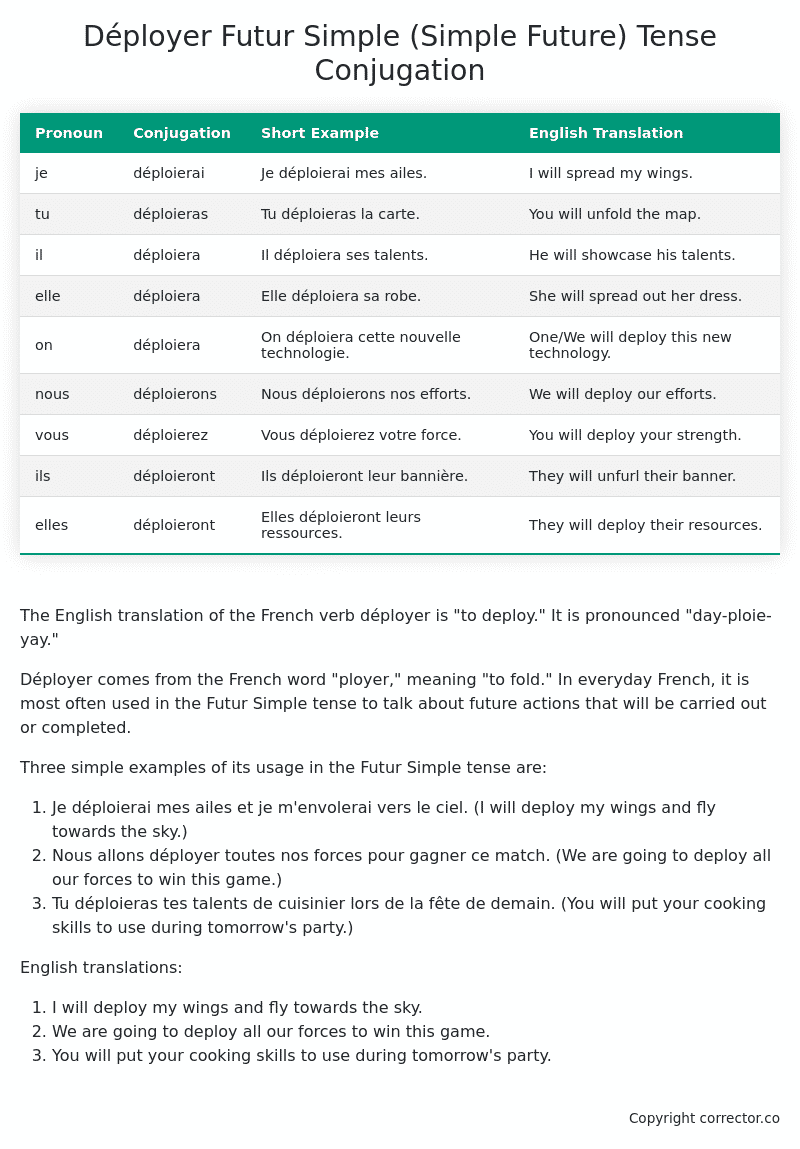Futur Simple (Simple Future) Tense Conjugation of the French Verb déployer
Introduction to the verb déployer
The English translation of the French verb déployer is “to deploy.” It is pronounced “day-ploie-yay.”
Déployer comes from the French word “ployer,” meaning “to fold.” In everyday French, it is most often used in the Futur Simple tense to talk about future actions that will be carried out or completed.
Three simple examples of its usage in the Futur Simple tense are:
- Je déploierai mes ailes et je m’envolerai vers le ciel. (I will deploy my wings and fly towards the sky.)
- Nous allons déployer toutes nos forces pour gagner ce match. (We are going to deploy all our forces to win this game.)
- Tu déploieras tes talents de cuisinier lors de la fête de demain. (You will put your cooking skills to use during tomorrow’s party.)
English translations:
- I will deploy my wings and fly towards the sky.
- We are going to deploy all our forces to win this game.
- You will put your cooking skills to use during tomorrow’s party.
Table of the Futur Simple (Simple Future) Tense Conjugation of déployer
| Pronoun | Conjugation | Short Example | English Translation |
|---|---|---|---|
| je | déploierai | Je déploierai mes ailes. | I will spread my wings. |
| tu | déploieras | Tu déploieras la carte. | You will unfold the map. |
| il | déploiera | Il déploiera ses talents. | He will showcase his talents. |
| elle | déploiera | Elle déploiera sa robe. | She will spread out her dress. |
| on | déploiera | On déploiera cette nouvelle technologie. | One/We will deploy this new technology. |
| nous | déploierons | Nous déploierons nos efforts. | We will deploy our efforts. |
| vous | déploierez | Vous déploierez votre force. | You will deploy your strength. |
| ils | déploieront | Ils déploieront leur bannière. | They will unfurl their banner. |
| elles | déploieront | Elles déploieront leurs ressources. | They will deploy their resources. |
Other Conjugations for Déployer.
Le Present (Present Tense) Conjugation of the French Verb déployer
Imparfait (Imperfect) Tense Conjugation of the French Verb déployer
Passé Simple (Simple Past) Tense Conjugation of the French Verb déployer
Passé Composé (Present Perfect) Tense Conjugation of the French Verb déployer
Futur Simple (Simple Future) Tense Conjugation of the French Verb déployer (this article)
Futur Proche (Near Future) Tense Conjugation of the French Verb déployer
Plus-que-parfait (Pluperfect) Tense Conjugation of the French Verb déployer
Passé Antérieur (Past Anterior) Tense Conjugation of the French Verb déployer
Futur Antérieur (Future Anterior) Tense Conjugation of the French Verb déployer
Subjonctif Présent (Subjunctive Present) Tense Conjugation of the French Verb déployer
Subjonctif Passé (Subjunctive Past) Tense Conjugation of the French Verb déployer
Subjonctif Imparfait (Subjunctive Imperfect) Tense Conjugation of the French Verb déployer
Subjonctif Plus-que-parfait (Subjunctive Pluperfect) Tense Conjugation of the French Verb déployer
Conditionnel Présent (Conditional Present) Tense Conjugation of the French Verb déployer
Conditionnel Passé (Conditional Past) Tense Conjugation of the French Verb déployer
L’impératif Présent (Imperative Present) Tense Conjugation of the French Verb déployer
L’infinitif Présent (Infinitive Present) Tense Conjugation of the French Verb déployer
Struggling with French verbs or the language in general? Why not use our free French Grammar Checker – no registration required!
Get a FREE Download Study Sheet of this Conjugation 🔥
Simply right click the image below, click “save image” and get your free reference for the déployer Futur Simple tense conjugation!

Déployer – About the French Futur Simple (Simple Future) Tense
Formation of Futur Simple
For regular -er verbs (e.g., parler – to speak)
For regular -ir verbs (e.g., finir – to finish)
For regular -re verbs (e.g., vendre – to sell)
Common Everyday Usage Patterns
Conditional Statements
Interactions with Other Tenses
Futur Antérieur
Conditional
Present
Summary
I hope you enjoyed this article on the verb déployer. Still in a learning mood? Check out another TOTALLY random French verb conjugation!


